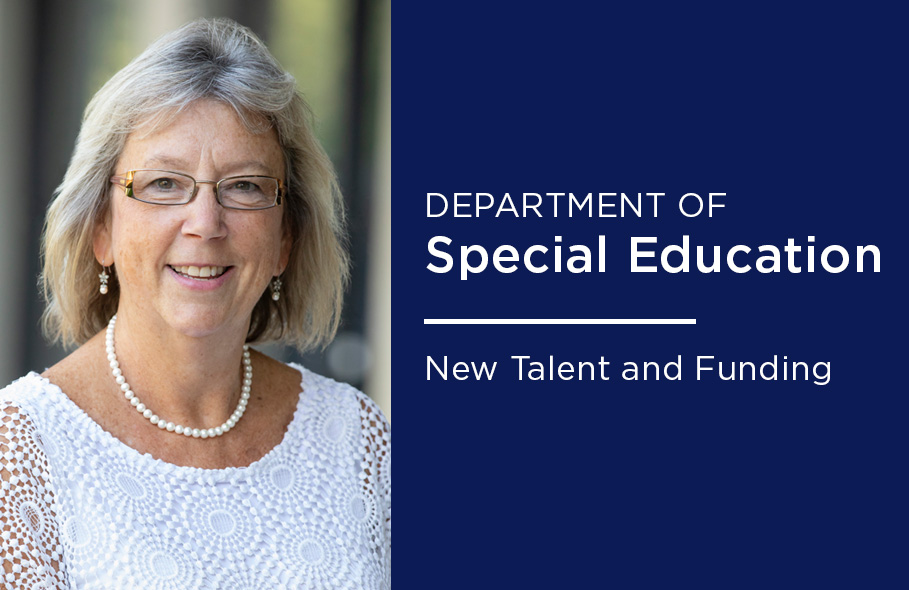New Talent and Funding Energize Sought-after Department
by Tom Hanlon / Sep 22, 2020

Amidst all the recent pandemic-associated changes in education, the Department of Special Education—perennially earning a Top 10 national ranking—continues to cement that high standing by recruiting new faculty, gaining new funding, and expanding its doctoral student cohort.
The Special Education Department in the College of Education at the University of Illinois at Urbana-Champaign has always been a tight-knit group.
“If you came to our department prior to March, you’d see multiple faculty here, students working in the bays, people having meetings, laughing, chatting,” says Michaelene Ostrosky, department head and Grayce Gauthier Professor of Education.
COVID-19 changed those dynamics last spring. But it hasn’t changed the department’s execution of its vision. That vision can be encapsulated in four words: faculty, funding, doctoral students.
Recruiting Faculty
“Our first priority is to recruit high-quality faculty,” Ostrosky says. “We’ve lost some over the years, and we teach so many certification courses on disabilities that students on campus need to take, as well as our gen ed courses and our own required certification courses for a special education teaching certificate.”
To that end, the department recruited Jessica Hardy last year; Hardy, an assistant professor, teaches courses in early childhood special education and conducts research in social emotional development, early math, and challenging behaviors. Amber Ray and Erica Mason just joined the faculty this fall as well; both focus their research around high incidence disabilities with a focus on literacy and math skills.
“We hope to gain the funding to look for one more faculty member,” Ostrosky reports. “We’ll be okay if we fill that position. The problem is, we have great faculty—we’re consistently ranked in the Top 10 in special education departments—and other universities have recruited some of our faculty away! We can take that as a compliment, but it’s frustrating to lose so many good people.”
Gaining Funding
The department continues to excel in garnering external funding, Ostrosky says. “Almost everyone in our department has one, if not multiple, grants funded federally or through the state or through foundations,” she notes. “Our portfolio of external funding is much broader than it was five years ago.”
For example, she points to two recent grants received by Stacy Dymond. One is from the Illinois State Board of Education to work with a professor in community health to create the Illinois Center for Transition and Work, a state-wide training and technical assistance center that focuses on the transition from school to work for students with significant disabilities. The other is a vocational training grant from the Illinois Department of Human Services and the Division of Vocational Rehabilitation. The latter grant is an interdisciplinary project between the College of Applied Health Sciences and the College of Education.
Growing Doctoral Student Numbers
The increase in funding that Ostrosky referred to has helped with that other major priority: attracting high-quality doctoral students.
“For our doctoral training programs, we pulled together as a group of faculty and put in multiple proposals with OSEP,” she says. “We never imagined we’d hit on all five we put in!”
The five OSEP (Office of Special Education Programs) grants enabled the department to recruit new doctoral students. Last year, there were four doctoral students in the Special Education cohort; this year, the new cohort is 13, helping the department to diversify its research interests.
“Our whole faculty came together to recruit our doctoral students,” Ostrosky says. “We made it an important mission of the department, saying, okay, we’ve got these grants, let’s get students funded on them!”
Mulling Over a New Online Master’s Program
The COVID-19 impact that resulted in classes going online last spring has also accelerated the idea of potentially offering an online master’s program in special education. “In the spring, our faculty was really pushed to think about how to engage students in an online format,” Ostrosky says. “It was stressful. But that experience got us to thinking maybe now’s the time to consider an online master’s as an option.”
As the saying goes, when one door closes, another opens. And so, the classroom doors that closed last spring may open up a whole new avenue to reach the students and educators who are so sorely needed in the field of special education.